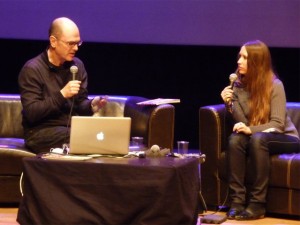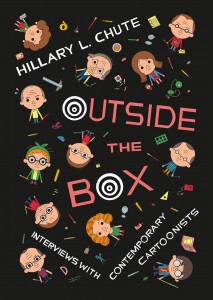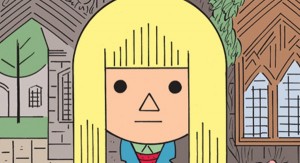For those of us who care about the “single vision” (Hillary Chute) of the comics creator who both draws and writes his/her comic, a related problem arises: shall we rely exclusively on the work itself to make meaning, or supplement (augment, complicate, tease out) this meaning by listening to the author’s comments on process, on intention, on effect? It’s an old question in literary criticism, and, of course, the answer is influenced by many things, including a) the availability of direct commentary from authors (interviews, journals, essays, forewords, etc.), b) prevailing approaches to texts in a given region, era, school of thought (contrast, most obviously, the penchant for psychoanalytic criticism at the beginning and end of the 20th century against the fetishization of the text alone by New Critics in the mid-20th century), and c) individual reader inclinations to treat works of art as ends in themselves (products) vs. a view of artistic creation that sees any particular text as a small manifestation and minor component of a larger artistic, or thought, project (process). Lately, I’ve been reading works of natural science more than those from humanities disciplines, and I think an apt biological analogy for what I’m describing would be the genotype/phenotype distinction.
If one examines the work of art (a given comic) as a unique entity deserving of close scrutiny, a world in itself, it might be argued that one is engaging in phenotypic study (i.e. exploration of the particular expression of an artistic gene, one of a kind as we humans are [purportedly] each one of a kind). Phenotypical study of single-creator comics also naturally allows for text-to-text comparison (inside a creator’s oeuvre as well as against works by others) but would eschew contextualizing the particular work of art in the self-espoused larger project of the work’s creator. A genotypical approach, in contrast, would expand out from the given work (which is, by its very nature, a limited, flawed, and partial expression of an author’s vision) to ask larger questions of the author: what is your artistic project? What is your process? In what ways does your work of art reflect or distort the concepts you are driven to illuminate by creating comics? No fear of intentional fallacy along this view; it becomes not only acceptable, but also necessary to query the author about the imagined ideal.
If you value the latter, you’ll find Hillary Chute’s latest publication, Outside the Box: Interviews with Contemporary Cartoonists (Chicago UP, 2014) essential reading. Chute is one of our premier comics scholars, combining a fine eye for formal comics criticism with a deep commitment to showcasing the human beings who create those very comics. This respect for creator and form has earned her an unusually trusted position in the art-comic community, softening the divide between academia and fandom. Leveraging this trust, Chute has gained direct access to some of our best: Chris Ware, Joe Sacco, Art Spiegelman, Alison Bechdel, Lynda Barry and others. These artists allow her to ask layered, intimate questions about their lives and their work; they allow her to broadcast and to print their responses. Outside the Box not only makes available these rare conversations, it also features excellent production values and graphics: the book is filled with full-color and sharply rendered black-and-white exemplar panels from each of her subjects. Even the paper and font is lush; it’s a really beautiful book. More importantly, however, it gives Chute a place to gather the thoughts of contemporary comics creators contiguously so that we can see more clearly that there is a synthetic thread aligning their projects, despite stark differences in their work; as Chute notes, “What is so riveting about the group of artists included in Outside the Box is how imbricated they are with each other–and yet how radically different all their work looks from each other’s.” (3) Chute clearly cares about genotypic concerns, with meta-reflection on the evolving form of comics as her primary aim: “The exhilarating feature of my interviews with cartoonists—for me, and hopefully for others—is that they capture moments of practitioners reflecting on the form as it is being shaped [emphasis hers] in contemporary culture.” (2)
Here are, for me, some of the highlights of those conversations, in light of the question I raised earlier in this post (is it valuable to listen to what comics creators say about their process and their products? Judge for yourself):
Françoise Mouly: “And because comics are a window into the thinking process of the artist, a revealing ‘automatic drawing’ as well as a distillation in concise terms of the author’s story, the object of the printed book integrates many crucial aspects.” (187)
Joe Sacco: “I think I understand how history works. I understand why one people are battling another people. I understand that they both want land. But ultimately there’s a level that I haven’t really got to yet. I’m touching on motive in places, like what makes someone pull a trigger? What makes one person beat another one to death? I know we can dehumanize people…. But I think I need to go in another direction after this book. What am I going to do after this? Keep detailing massacres? For me, personally, I think I’m not going to get anything out of it anymore. I’ve come to the end of that.”
Hillary Chute: “You mean in the arc of your career?”
Joe Sacco: “In the arc of my understanding of why people do things and how things develop the way they do. It’s not that there aren’t other incidents I could detail and make a great book about—an interesting book. It’s just that for me, personally, it won’t lead me anywhere new, and it’s kind of about me on some level. If you’re a creative person, it has to be, I think.” (143-4)
Daniel Clowes: “[Wilson]’s certainly got my history to some degree. I’d sort of like to keep that as vague as possible, because some of what he’s about is exactly me and some of it is the opposite of me. I mean, everything is made up for the most part. There’s a grain of truth to it all, and everything is made up. That’s why I never wanted to do autobiography, because it’s so much easier to make things up.” (113)
Daniel Clowes: “I certainly know when I sit down to re-read all my comics, I’m overwhelmed by how much more personal they are than I ever thought they were.” (114)
Alison Bechdel: “To go back to your touch question, I feel like the book is in a way me, my self, my body. And I’m asking the reader to hold me not just figuratively, in the sense of an analytic ‘holding environment,’ but literally. “Hold me!” It is so pathetic! What was I thinking?”
Hillary Chute: I really love this response. You and I are teaching a course together on autobiography, and one of the books we’re teaching is Roland Barthes by Roland Barthes. He discusses his idea that ‘one writes in order to be loved’—and then he says this idea is endurable only if you first find it touching, then imbecilic. Then you are finally free to find it accurate. But I love the idea of writing in order to be held.” (174)




This is actually a topic that’s come up before on the blog…and somewhat contentiously.
Thinking about comics creator interviews in terms of literary criticism or movements makes sense. But I think there’s maybe a more direct connection to comics crits roots in fandom. Interviews have been an unusually important part of comics criticism for a long time it seems; TCJ interviews were central to that central magazine, and now there’s the U Miss Conversations series.
Again, it seems like it’s part of fandom…and particularly part of comics’ effort to create an auteur function, and more the center of fandom away from character properties and to artists. So, I guess I feel like the focus on creator interviews isn’t (just) about understanding the work, but also is about the cultural position of the work. It’s not just analytic, but performative, it semes like.
Fandom is pretty much defined by creating cults of personality around artists. The fetishization of the interview would seem to be a natural outgrowth of that.
Interviews can be valuable, but they are hardly a be-all-end-all. An over-reliance on them can really distort one’s perspective. Artists are often not the best explicators of their work. They may also be interested in promoting a view of the work that isn’t particularly well supported by the work itself.
The fetishization of interviews has done a good deal of damage to comics historiography. The thinking often is that if the interviewee says something it must be true, or is accurately reflective of the underlying situation. Primary source documents, bibliographic data, and so forth don’t need to be bothered with. My research into Steve Gerber is a lesson in how foolish that can be. From what I saw, he was an extremely deceitful and self-serving individual who treated interviewers as dupes. His accounts of his assorted travails with Marvel–over his 1978 termination, his lawsuit, his editorial conflicts–are generally contradicted by the full range of evidence. And a lot of his bullshit has gotten enshrined as fact in ostensibly serious books and articles. Most comics figures are probably not as prone to bad faith statements as Gerber was–at least I hope not–but their memories play tricks on them and so forth. Interviews are probably the least reliable form of evidence, and the information in them needs to be as vetted as much as possible. They’re an interesting starting point, but that’s all. God forbid you tell comics fans that, though.
Of course, Robert, you used interviews as evidence in the above. Yes? The trick is not to use them as your ENTIRE or EXCLUSIVE evidence, and not to use one interview subject as the source of information for historical arguments.
The value of Chute’s interviews in this book is not merely evidential; these interviews are thoughtful meta-texts, artful and interesting in their own right, and useful for thinking about comics even if the interviewees’ remarks are sometimes autobifictional (to paraphrase Lynda Barry). Robert, you seem to be applying a juridical standard of truthfulness above, which I agree may be important for historiography, but not always for criticism IMO.
Charles, are we disagreeing? Your confrontational tone notwithstanding, I don’t think we are.
There is nothing more boring to me than such interviews when they are about the artist’s work. I don’t mind and sometimes like hearing about their influences, their upbringing, other comics or literature they like, but talking about their own work? Yawn and useless.
I think artists talking about their work can be interesting sometimes…it can tip over into marketing copy in a way that’s not so great, but I don’t think it always has to.
The most productive (and least boring) way to talk about one’s work is to do one’s work, if you know what I mean.
While I do agree with the assertion that artists are in general self-serving bullshitters…
A very long time ago (almost 20,000 years in Internet Time) I did some comic reviews for the Webcomics Examiner. I decided to focus on certain aspects of the craft of each comic. Art, story, that sort of thing.
Then emailed the review to the artist and had them comment on why they made the choices they did. Not as a rebuttal, but to show that what the artist thinks and the audience perceives aren’t always the same thing.
In retrospect, it was a bit clunky and my critic-fu was pretty shitty. However, I felt that it was a very good thing to include the artist because it helped minimize the “Whah! You hate me!” business on both sides of the Creator – Critic divide.
Anyway, this was probably tangential, but that’s what the article made me think of.